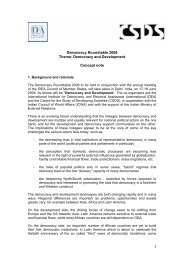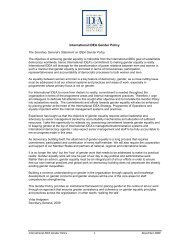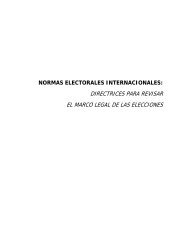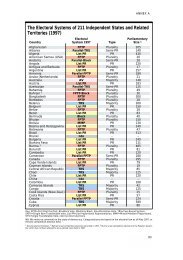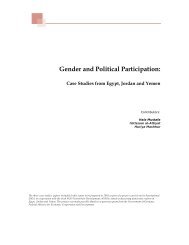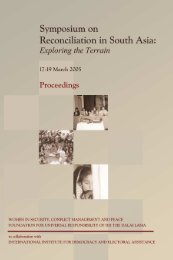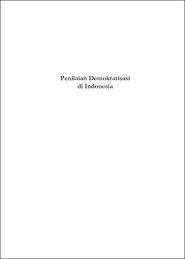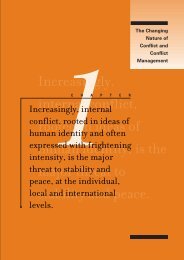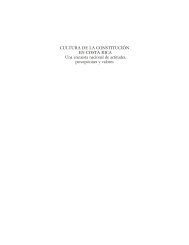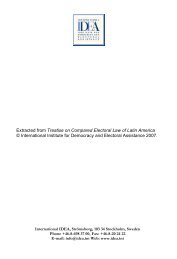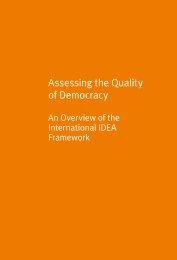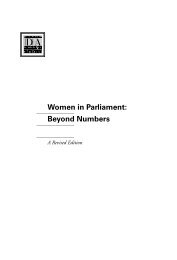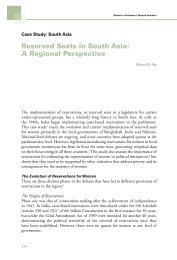The Role of State Constitutions in Protecting ... - International IDEA
The Role of State Constitutions in Protecting ... - International IDEA
The Role of State Constitutions in Protecting ... - International IDEA
You also want an ePaper? Increase the reach of your titles
YUMPU automatically turns print PDFs into web optimized ePapers that Google loves.
mak<strong>in</strong>g <strong>of</strong> the Lyttleton Constitution <strong>of</strong> 1954, m<strong>in</strong>ority groups <strong>in</strong> Nigeria<br />
expressed fears <strong>of</strong> discrim<strong>in</strong>ation, marg<strong>in</strong>alization and oppression. This led<br />
to the sett<strong>in</strong>g up <strong>of</strong> the Will<strong>in</strong>ck Commission on 26 September 1957. <strong>The</strong><br />
Commission recommended the entrenchment <strong>of</strong> fundamental human<br />
rights <strong>in</strong> the Constitution. This recommendation was accepted and<br />
fundamental human rights provisions have formed part <strong>of</strong> Nigeria<br />
Constitution from the Independence Constitution <strong>of</strong> 1960 to date.<br />
◆ Adoption <strong>of</strong> Multi-party system: It was reasoned that a multi-party<br />
system would give the ethnic m<strong>in</strong>orities an opportunity to protect their<br />
<strong>in</strong>terest.<br />
◆ Modification <strong>of</strong> Electoral system: As from the Second Republic, to<br />
become a president <strong>of</strong> Nigeria, a successful candidate is not only required<br />
to obta<strong>in</strong> a majority <strong>of</strong> votes cast but must also obta<strong>in</strong> not less than onequarter<br />
<strong>of</strong> the votes cast <strong>in</strong> the election <strong>in</strong> each <strong>of</strong> at least two-thirds <strong>of</strong> all<br />
the <strong>State</strong>s <strong>of</strong> the Federation. This was provided for <strong>in</strong> Sections 125–126 <strong>of</strong><br />
the 1979 Constitution and replicated <strong>in</strong> sections 130–132 <strong>of</strong> the 1989<br />
Constitution and sections 131–134 <strong>of</strong> the 1999 Constitution.<br />
◆ Constitutional prohibition <strong>of</strong> Ethnic and Religious parties: In the<br />
first Republic, the major political parties were <strong>of</strong> ethnic orig<strong>in</strong>. 37 It has been<br />
argued that the ethnic orientations <strong>of</strong> the political parties were among the<br />
ma<strong>in</strong> reasons for the collapse <strong>of</strong> the republic. 38 In order to address this<br />
pitfall, the 1979 Constitution <strong>of</strong> the Second Republic prohibited the formation<br />
<strong>of</strong> political parties with ethnic or religious connotation. Section 202<br />
<strong>of</strong> the constitution provides that “No association by whatever name called<br />
shall function as a political party unlessa)<br />
<strong>The</strong> names and addresses <strong>of</strong> its national <strong>of</strong>ficers are registered with<br />
the Federal Electoral Commission;<br />
b) <strong>The</strong> membership <strong>of</strong> the association is open to every citizen <strong>of</strong> Nigeria<br />
irrespective <strong>of</strong> his place <strong>of</strong> orig<strong>in</strong>, sex, religion or ethnic group<strong>in</strong>g;<br />
c) A copy <strong>of</strong> the constitution is registered <strong>in</strong> the pr<strong>in</strong>cipal <strong>of</strong>fice <strong>of</strong> the<br />
Commission <strong>in</strong> such a form as may be prescribed by the commission;<br />
d) Any alteration <strong>in</strong> its registered constitution is also registered <strong>in</strong> the<br />
pr<strong>in</strong>cipal <strong>of</strong>fice <strong>of</strong> the Commission with<strong>in</strong> 30 days <strong>of</strong> the mak<strong>in</strong>g <strong>of</strong><br />
such alteration;<br />
e) <strong>The</strong> name <strong>of</strong> the association, its emblem or motto does not conta<strong>in</strong><br />
any ethnic or religious connotation or give the appearance that the<br />
activities <strong>of</strong> the association are conf<strong>in</strong>ed to a part only <strong>of</strong> the<br />
geographical area <strong>of</strong> Nigeria; and<br />
f) <strong>The</strong> headquarters <strong>of</strong> the association is situated <strong>in</strong> the capital <strong>of</strong> the<br />
federation.<br />
This provision was repeated <strong>in</strong> Section 220 <strong>of</strong> the 1989 Constitution and section<br />
221 <strong>of</strong> the 1999 Constitution.<br />
37) <strong>The</strong> Northern Peoples Congress (NPC) emerged from a Northern based cultural group known as Jam’iyyar Mutanen<br />
Arewa with the support <strong>of</strong> Hausa-Fulani while the Yoruba cultural organization Egbe Omo Oduduwa metamorphosed<br />
<strong>in</strong>to the Action group with its base <strong>in</strong> Western Nigeria. <strong>The</strong> National Convention <strong>of</strong> Nigerian Citizens (NCNC) had its<br />
base with<strong>in</strong> the core <strong>of</strong> Igboland <strong>in</strong> Eastern Nigeria. Other smaller parties like Northern Elements Progressive Union<br />
(NEPU), United Middle Belt Congress (UMBC) and Niger delta Congress had their ethnic support from the Hausa/Fulani<br />
peasants, Tiv and Ijaw/Kalabari respectively.<br />
38) Abubakar, D (1997), “<strong>The</strong> Rise and Fall <strong>of</strong> the First and Second Republics <strong>of</strong> Nigeria”, <strong>in</strong> Okafor, F. U.(1997) (Ed), New<br />
Strategies for Curb<strong>in</strong>g Ethnic and Religious conflicts <strong>in</strong> Nigeria, Enugu, fourth Dimension Publishers<br />
50



